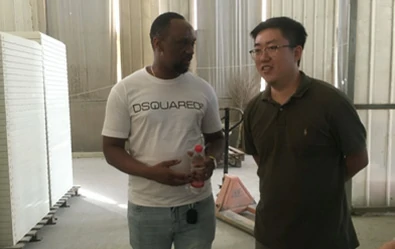loading...
- No. 9, Xingyuan South Street, Dongwaihuan Road, Zaoqiang County, Hengshui, Hebei, China
- admin@zjcomposites.com
- +86 15097380338
- Welcome to visit our website!
frp pressure vessel
Understanding FRP Pressure Vessels Properties, Applications, and Advantages
Fiber-reinforced polymer (FRP) pressure vessels are increasingly gaining prominence in various industrial applications due to their exceptional performance characteristics and durability. These vessels are designed to withstand high pressure and corrosive conditions, making them ideal for a variety of sectors, including chemical processing, oil and gas, and water treatment.
What is FRP?
FRP is a composite material made from a polymer matrix reinforced with fibers. The fibers, often made from glass, carbon, or aramid, significantly enhance the strength and stiffness of the polymer, creating a lightweight yet highly resilient material. The combination of lightweight properties and high strength makes FRP an attractive choice for pressure vessels, which are typically heavier when made from traditional materials like steel or aluminum.
Key Properties of FRP Pressure Vessels
1. Corrosion Resistance One of the most significant advantages of FRP pressure vessels is their resistance to corrosion. Unlike metal vessels that can deteriorate when exposed to corrosive substances, FRP materials can withstand harsh chemicals, making them suitable for storing and transporting various fluids without the risk of leakage or contamination.
2. High Strength-to-Weight Ratio FRP offers an exceptional strength-to-weight ratio, allowing manufacturers to create lighter vessels that do not compromise on strength or safety. This property also simplifies handling and installation, reducing labor costs and the need for extensive support structures.
3. Thermal Insulation FRP materials provide good thermal insulation properties, helping to maintain temperature control within the vessel. This is particularly beneficial in applications where temperature regulation is critical, such as in the storage of chemicals that require stable conditions.
frp pressure vessel

4. Design Flexibility The versatility of FRP materials allows for intricate designs and shapes, enabling the creation of custom pressure vessels tailored to specific operational needs. Manufacturers can adjust the fiber orientation and layering to optimize strength and performance for the intended use.
5. Longevity and Low Maintenance FRP pressure vessels are known for their durability and long service life. They require minimal maintenance compared to metal counterparts, which may require regular inspections and repairs due to corrosion or fatigue.
Applications of FRP Pressure Vessels
FRP pressure vessels are employed across numerous industries, including
- Chemical Processing They are widely used for storing and transporting aggressive chemicals without the fear of corrosion or leaks. - Water Treatment FRP vessels are utilized in various water treatment processes, including filtration and chemical dosing systems. Their corrosion resistance makes them suitable for contact with water and wastewater. - Oil and Gas In the oil and gas sector, FRP vessels are used for storage and processing, especially in offshore applications where weight savings are crucial and exposure to corrosive environments is common. - Pharmaceuticals The sanitary properties of FRP make it suitable for the pharmaceutical industry, where contamination must be strictly avoided.
Conclusion
The adoption of FRP pressure vessels is on the rise due to their superior properties and advantages over traditional materials. From corrosion resistance to lightweight design and thermal insulation, FRP vessels are well-suited for a wide range of applications across various industries. As technology progresses and industries seek more efficient and sustainable solutions, the use of FRP in pressure vessel design is expected to grow, further solidifying its role as a vital component in modern engineering solutions. With ongoing innovations, FRP pressure vessels promise to enhance safety, efficiency, and longevity in critical applications demanding high-performance materials.
-
The Rise of FRP Profiles: Strong, Lightweight, and Built to LastNewsJul.14,2025
-
SMC Panel Tanks: A Modern Water Storage Solution for All EnvironmentsNewsJul.14,2025
-
GRP Grating: A Modern Solution for Safe and Durable Access SystemsNewsJul.14,2025
-
Galvanized Steel Water Tanks: Durable, Reliable, and Ready for UseNewsJul.14,2025
-
FRP Mini Mesh Grating: The Safer, Smarter Flooring SolutionNewsJul.14,2025
-
Exploring FRP Vessels: Durable Solutions for Modern Fluid HandlingNewsJul.14,2025
-
GRP Structures: The Future of Lightweight, High-Performance EngineeringNewsJun.20,2025
